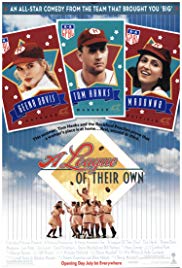
A LEAGUE OF THEIR OWN
US, 1992, 128 minutes, Colour.
Tom Hanks, Geena Davis, Madonna, Rosie O’ Donnell, Lori Petty, David Strathairn, Garry Marshall, Eddie Jones, Bill Pullman, Megan Cavanaugh, Jon Lovitz.
Directed by Penny Marshall.
A League of their Own was a very popular film with American audiences in 1992. Looking back on it from the perspective of the 21st century, it seems rather pioneering, especially about the presence of women in sports, maltreatment of sportswomen, some mockery, and not anticipating that in the 21st century women would be prolific in all kinds of sports, not only basketball, but baseball and the various codes of football.
This is a memorial and a tribute to the women who took up professional baseball during World War II with the absence of the men. Entrepreneurs promoted – but were prepared to drop the women when America started winning the war and the men would return, not anticipating the popularity of women in sport. (This is also the period in which that were developments in the presence of African- Americans in baseball, with Jackie Robinson.)
The action takes place during World War II, focusing on two young women, Dottie and her sister Kit (Geena Davis and Lori Petty)..
1. The title, the baseball leagues? The history? Men? World War and the women?
2. The film as a memoir and as a tribute? The finale in the Hall of Fame?
3. The film of the early 1990s – ahead of its time in terms of themes of women’s sport? Transformations in the 21st-century?
4. The film as a true story, the background of World War II, American involvement, the men leaving and serving? The status of baseball during the war? The entrepreneurs, the ideas of women’s teams, recruiting, forming a leave leak, competition, competitiveness, the slow response of the public, the final achievement?
5. The screenplay and the representation of men and women, chauvinism, putting women down, the mockery? Issues of stereotypes? The question of what would happen after the war – and the women returning to the kitchen (the scoffing of the idea that the men would go to the kitchen)?
6. Dottie’s story, seeing her as older, renewal of acquaintance with friends, her sister, sharing? Deaths? Memories?
7. Dottie and Kim, milking the cows, skill at baseball, the local matches, Dottie successful, Kim in the shadows?
8. The talent scout, the match, turning up, watching the milking, from the city? Trying to persuade Dottie? Her refusal, change of heart for Kim, hurrying to the train? Stopping on the way, the encounter with Marla and her father, her awkwardness, looks, her father’s plea?
9. The other girls, a range of characters, nice, the talent, the brisk and assertive types, Madonna and Rosie O’ Donnell? Background of families, men going to the war, messages about deaths?
10. The entrepreneur, ambitions, wealth, the idea of the baseball team? Winding down because of the end of the war and America succeeding in the war?
11. The assistant, his continued help, engaged for the teams, his promoting them, finding photo opportunities, their uniforms? The girls complying?
12. The slow audiences, some mockery, increasing numbers, the response to the uniforms?
13. The girls travelling, the collages of so many of the matches? Friendships, dressing rooms?
14. The spirit amongst the girls, sincere, wisecracks, the girl who couldn’t read and learning? The message and Betty’s husband dead?
15. Tom Hanks as Jimmy, the background of his drinking, his injury, successful past, with the entrepreneur, getting the job, his gradually changing, initially sharp-tongued, sleeping, underestimating the women? The discussions with Dottie, on the bus?
16. The boy, on the bus, the driver walking off, his upsetting people – and Jimmy throwing the ball at him at the end?
17. The rivalry between Kit and Dottie, Dottie not wanting, Kit’s sense of inferiority, the continued comparisons? The transfer to the rival team? The final match, Dottie and the physical clash? Some success for Kit, the two sisters talking together?
18. Dottie, at home in baseball, yet not wanting to stay? Bob’s return, their leaving, coming back to the game, his support of her?
19. A creative idea for the war and the war effort? The aftermath in the 20th century? Changes and women’s participation in sport in the 21st-century?